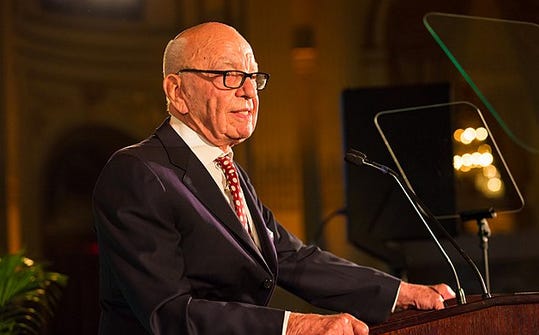“The Kids at Trestle Creek,” June 2013, with the City of Sandpoint, ID off in the distance.
“Succession,” Revisited
As I disclosed some time ago, my daughter and I were sharing a guest room in Denver a couple years ago when Audrey got me hooked on “Succession.” This was the hit HBO drama series in which the patriarch, Logan Roy (played by actor Brian Cox) was based on the real-life saga of media mogul and FOX News boss Rupert Murdoch. Audrey was watching it on her laptop. I was drawn in by osmosis.
I don’t know that this was healthy for me. To be sure, the scripts, the acting and cinematography were brilliant. But none of the main characters were likable; the story was so dark and all the more so (for me) because the fictional Roy family’s wealth was rooted in journalism—a FOX News-like media empire (Waystar RoyCo) generating tons of profit pumping out inflammatory propaganda while also serving as a launch pad for aspiring right-wing political figures. And still I was hooked, even though it gave me bad dreams.
The same year (1979) I graduated from Washington State University with a degree in journalism the legendary reporter David Halberstam published The Powers That Be. The book was both a piercing critique of the-then pillars of American journalism (Time Magazine, The New York Times, CBS News, The Los Angeles Times, The Washington Post) and a paean of sorts to the publishers and editors who pushed the envelope of investigative journalism, often at risk of profitability and sometimes at risk of incarceration. The profit model of American journalism is its Achilles heel. But Halberstam’s book offered some hope that ethical standards and enlightened publishers can comprise an immune system of sorts, to resist and defuse the inevitable pressures and corruptions of a business model that depends heavily on advertisers and answers to shareholders and (increasingly) hedge fund managers.
The plot lines in Succession brutally peeled that notion apart. Waystar Royco (the fictional version of Fox News) was profitable and powerful through vice, not virtue. The drama focused on the family’s cynicism and ruthless infighting—to see who would inherit the aging patriarch’s power once he expired or decided to step down. My favorite character in the serial was Ewan Roy (played by James Cromwell), the brother of the patriarch. Ewan’s role was that of a towering prophet (Cromwell is 6’7” inches in height) who’d make periodic appearances to directly confront Logan Roy about what a contemptible person he is and how much damage his Fox News-like network was doing to humankind and the planet.
The HBO series unfolded to critical acclaim. Then, as fate would have it, events in the real world caught up. Fox was sued for defamation by Dominion Voting Systems. Dominion alleged Fox repeatedly broadcast allegations that the company purposefully manipulated its voting machines to shift votes to Joe Biden, thereby depriving Donald Trump of victory in the 2020 presidential election.
Fox News hosts Martha MacCallum and Brett Baier at a “town hall” interview with Donald Trump in Scranton, PA in March 2020. (Photo courtesy Wikimedia images)
Internal Fox communications unearthed during discovery in the case were devastating for Fox as was Rupert Murdoch’s January 2023 deposition, in which the Fox Corporation chairman acknowledged his network repeatedly provided a platform for election fraud allegations that he and other top officers at Fox knew to be lies. In April of last year, on the day set for trial in the case, Murdoch agreed to settle the case for $787.5 million.
The stunning announcement of the payment to Dominion begged the question as to which of the stories was more darkly dramatic—the fiction of “Succession” or the corruption of Fox News and the infighting of the real-life Murdochs. We now have that answer and it just happened to arrive last Wednesday, smack in the middle of one of the most captivating political weeks in U.S. history.
The bombshell
On a day when much more attention was being given to J.D. Vance’s provocative view that America is being run “by a bunch of childless cat ladies” the New York Times published a remarkable story. It did so under this headline: The Secret Battle for the Future of the Murdoch Empire.
In a nutshell, it’s about what had been, until last week, a remarkable but hidden story—a bold legal maneuver Rupert Murdoch is attempting in a Nevada courtroom to disenfranchise three of the four Murdoch children who stand to inherit controlling interests in the family media empire.
The Times story, by veteran journalists Jim Rutenberg and Jonathan Mahler, offers vivid details about how the patriarch’s legal ploy (guided by Donald Trump’s former attorney general William Barr) has greatly inflamed a rift in the family. That, in itself, makes for a riveting read. But there’s a much deeper and consequential dimension to the story that goes well beyond the Murdoch family rivalries. It’s one that’s actually crucial to understanding how we’ve gotten to a point where American voters are asked to choose—in just 100 days from now—between a traditionally democratic candidate and one who openly admires autocrats and has already succeeded in packing the U.S. Supreme Court with a majority of justices who espouse broad immunity for presidents who violate the law in the course of their “official” acts.
The Backstory
This is not your average business story, though it did start out that way. Murdoch’s father died young in 1952 and left his then-21 year old son to inherit the management of a modest newspaper publishing business in Australia. By the time he was 30, Murdoch had acquired several other newspapers in his native Australia, before moving to acquire newspapers in New Zealand and Great Britain.
Rupert Murdock receiving a “Global Leadership Award” from the Hudson Institute in 2015 (photo courtesy Wikimedia images)
Murdoch has a long record as a hands-on publisher—directly involved in key editorial decisions—and became well known for using his newspapers and, later, his broadcast properties to overtly support political movements, leaders and candidates he favored. He moved to New York City in 1973, acquired his first U.S. newspaper the following year, and began purchasing U.S. broadcast properties in the mid-1980s. He became a U.S. citizen in 1985. In 1996 he launched the Fox News cable channel and hired long-time Republican media strategist Roger Ailes to be its CEO. (Ailes was forced to resign in July of 2016 as a result of several sexual harassment allegations by female Fox News employees.) Murdoch is now one of the wealthiest people on the planet with a net worth estimated by the Bloomberg Billionaires Index at $10.2 billion.
Murdoch is now 93 years old, and recently married for the fifth time. He has six children but, at least as of last week, the rivalry for succession has centered on the bitter split between his eldest son Lachlan (53), and second oldest son James (51), both fathered by Murdoch when he was married to his second wife, Anna Torv. Lachlan is a top executive at Fox and the heir apparent to succeed his father. On the other hand, James has been highly critical of the network’s right-leaning bias. He resigned from the parent company’s board of directors four years ago, and, along with his wife Kathryn, released a bitter indictment of news media complicity in spreading false election fraud information in the run up to the assault on the capitol in January 2021. Although the couple didn’t explicitly reference Fox News, there’s no question where they were focusing their aim.
To continue reading, please subscribe to The Daily Rhubarb at the link below…
—tjc










